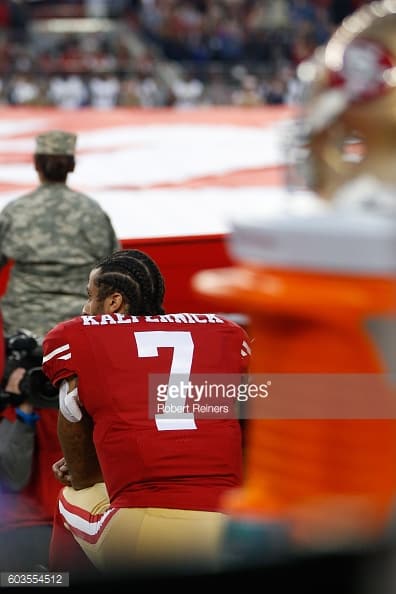Colin Kaepernick sat, then took a knee. Megan Rapinoe and dozens of other athletes joined the protest, sparking a national conversation about appropriate behavior during the national anthem. But the athletes’ protests have also raised this question: What does the national anthem have to do with sports in the first place?
Apparently, the anthem became a sports ritual during the 1918 World Series, where war-wearied spectators found more joy in “The Star-Spangled Banner” than baseball. Nearly 100 years later, sports and the anthem remain hitched. Eric Liu, who co-authored a book on patriotism, suggests one reason why: “We are united by a creed, and in a creedal society, the outsize rituals — like the anthem — just carry a lot more weight.”
“Creed” is a touchy subject in this country. We debate whether “God” has any place in the Pledge of Allegiance. We go nuts if a public official puts up a Nativity scene. We have a presidential candidate who might block immigrants based on their beliefs. Yet, almost in spite of ourselves, we have a creed: All men and women are created equal.
Like any creed, ours comes with rituals. Indeed, singing the anthem at sporting events is about as close as we come to regular, national prayer.
If you’re not sure the anthem can be prayerful, watch this:
The video shows high school students singing in a hotel atrium. But it feels more like they’re in church, singing a beautiful hymn. 1 The same can happen in any stadium where, like a prayer, the anthem demands reverence: We pause, remove our caps, and assume an appropriate posture. And as we sing or listen to the words of our anthem, we recommit ourselves to the ideas they profess. We renew our desire to be the land of the free and the home of the brave.
Sometimes we achieve this desire Other times we don’t. Certainly, we are the home of many brave men and women — not least among them, the soldiers who continue to risk their lives in the Middle East, or the first responders who rushed to the World Trade Center 15 years ago. We are also a land of tremendous freedom.
Still, racism, sexism, and many other forms of discrimination persist. Not everyone here is free.
Like any other prayer, the national anthem expresses our hope for things not yet seen. 2 When Christians pray the “Our Father,” we ask God’s will be done, and we intend to cooperate with that will. But that doesn’t mean we always successfully cooperate with God. Still, we pray with confidence: “Thy will be done.”
In the same way, proclaiming ourselves “the land of the free” does not automatically make it true. Sometimes we fall short of that goal, and it’s important to name that.
An admission of failure — “Forgive us our trespasses” — is built into the “Our Father.” But our national hymns — at least the verses we know 3— have nothing of the sort. While we heap praise our country, we fail to recognize that America isn’t perfect. We fail to acknowledge our sins.
I think that’s what Kaepernick and Rapinoe are getting at. They don’t hate our country, and they certainly don’t hate the brave men and women who protect it. Instead, they would like us to admit our collective failures, the first step toward ensuring liberty and justice for all 4.
***
You can’t walk around Berlin without encountering multiple memorials to the victims of past regimes. In the heart of the city, by the Brandenburg Gate, there is a Memorial to the Murdered Jews of Europe. Down the road is a Memorial to Homosexuals Persecuted under Nazism. All along the path of the former Berlin Wall, white crosses mark the murder of Eastern Germans who tried to escape to West Berlin. Other cities — such as Munich, Nuremberg, and Cologne — have their own Nazi “documentation centers,” whose express purpose is to document what went wrong in the 1930s and 40s. Germany is naming its sins and attempting to make amends 5.
Like Germany, we live in a “post-genocidal” society 6. Our history includes the destruction of Native American peoples, slavery, and the domestic terrorism of Jim Crow. Today it includes the mass incarceration of black people and other minorities 7.
But often, we fail to admit that we’ve done anything wrong. Rather than honor the people we’ve oppressed, we maintain roads and state holidays that honor Confederate heroes 8. We often choose not to press charges when white police officers attack people of color, effectively asserting that it is not possible that the officer has done anything wrong.
Seeing a disconnect between these hard realities and the beliefs we profess, Kaepernick and his followers have injected a humbling dose of reality into the national anthem. Whether they sit, kneel, or lock arms, they remind us that we aren’t always “the land of the free.” That threatens our sense of perfection — and damages our sense of superiority. No wonder some Americans call these protests “disrespectful” or “unpatriotic.”
But isn’t it patriotic to call your country to something greater? No good Christian says the “Our Father” without calling to mind her imperfections. Perhaps no good patriot, while singing the national anthem, should overlook her country’s flaws. As former Missouri Senator Carl Schurz put it, “My country, right or wrong. If right, to be kept right; and if wrong, to be set right.”
We cannot undo the sins of our past. But we can name them, try to make amends, and resolve to do better in the future. For Christians, this happens in the “Our Father.” For Americans, it can happen during the national anthem. Think of it as a prayer. It might even help if you kneel.
- It’s not for nothing that the Spanish for “anthem” is himno. Play around on WordReference.com, and you’ll find the same holds true in various languages. ↩
- Cf. Hebrews 11:1. ↩
- The closest thing I can find is the second verse of “America the Beautiful,” which says, “America! America! God mend thine every flaw…” ↩
- See, for example, Kaepernick’s explanation of his actions on Aug. 28. ↩
- Germans, by the way, no longer sing the hyper-nationalistic parts of their national anthem. They typically sing only the third verse, which promotes “unity, justice, and freedom.” ↩
- I’m borrowing this term from civil rights lawyer Bryan Stevenson, who recently spoke at Loyola University Chicago ↩
- For more, see Stevenson’s TED Talk, or read his book. ↩
- By contrast, after the fall of Hitler, none of these European streets retained Hitler’s name ↩


